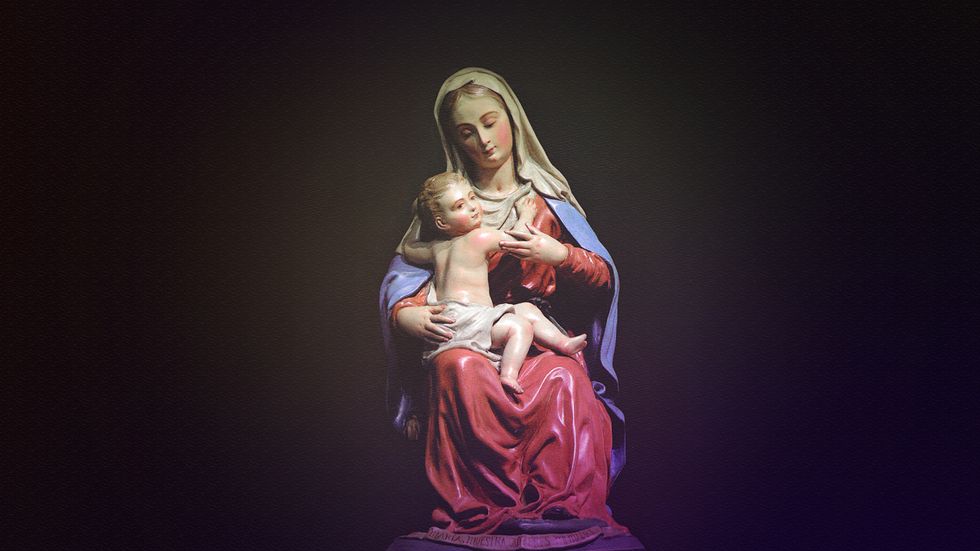Every middle schooler bandwagons; they feel pressured to do what everyone else is doing, so naturally, they do it, too. I never grew up particularly religious despite living in a household that claimed Protestantism and godliness. I prayed every night before bed with my grandmother when I was very young. I owned cross necklaces. I celebrated Christian holidays. I was a Christian, but only in name (as is my entire family, though they are loath to admit that). As far as I knew, I believed in God. He had all the answers. Everything that happened was through Him.
In middle school particularly, I began to feel as though I needed something more in my life. Now, to begin with, I wasn't very knowledgeable about religion before. I typically followed whatever my family told me and went on with my life, as most children do. I didn't know the ins and outs of the Christian faith, I didn't know what they believed in, and I didn't know any of the rituals or verses. I began attending church in sixth grade to find meaning in all of this. I grew up calling myself a Christian, yet I didn't do anything a Christian is "supposed" to do. I became involved with the youth group at my local Protestant church, which included performing in front of parents on Easter Sunday. I sang about God, I read about Him, and I attended mass.
Even then, I didn't like what they were saying. I didn't believe any of it. My lack of belief felt inherent; I felt like there was no way I would ever believe all of it. I was never taught any of that growing up. How was I supposed to believe a man walked on water or talked to an almighty being in the sky?
After that realization, I began to lose faith. Literally. I still called myself a Christian. I even forced myself to return to mass again several years later, although this time in Catholic Church. I assumed that I had just not found the right branch of Christianity for me; maybe it was Protestantism's fault, not mine. I felt as though my family looked down upon me for my belief, or lack thereof. I pressured myself into praying, attending mass, and identifying as Christian to my friends and people online.
But something in the back of my head told me the truth: I didn't believe any of it. And that was okay. I was terrified to admit it in this Christianity-dominated world, and even moreso in my largely Christian suburb. It was rare to find someone who didn't staunchly believe in God and Jesus.
High school opened me to a world of activism; I became a feminist and a rigid supporter of Planned Parenthood. I attended marches and rallies in favor of pro-choice legislation. I joined my school's Gay-Straight Alliance. I became an active member of NARAL Pro-Choice. I still was pushing myself to believe in these Christian ideologies, even continuing to attend Catholic mass on Sundays. I met with a priest of my local Catholic Church to consider fully converting to Catholicism because, despite me knowing I did not believe in the words of the Bible, I thought immersing myself entirely would solve it.
I met with the priest a second time to discuss some questions I had about the church and its stance on things like LGBT rights and feminism. The meeting left me hollow and hopeless; they not only didn't align with my beliefs (as I knew from mainstream media), but they were so against it, they considered not allowing me to convert if I were to continue in the process. Heartbroken, I realized, finally, I was not going to keep pushing myself into the church.
For many years, I felt trapped inside the narrow idea that I had to be someone I was not. I worried constantly about my future with religion and how it would affect me and my beliefs. I could not sit in church every Sunday for the rest of my life, listening to sermons that I did not agree with, associating myself with people who hated my activism within my community. I believed in a higher power who loved all of his or her children, regardless of their personal life choices, and I feel now that the Christian God is not the God I believe in. Breaking through the chains of feeling forced to practice a religion helped me to realize that there is more to life than that.
I respect everyone's right to practice their own religion and believe in their God; the First Amendment is pretty great. But I don't want to ever feel like I have to believe in God, and while some may feel my impression of the Christian faith is incorrect or unjustified, I say only this: to each his own (1 Corinthians 15:23).

















